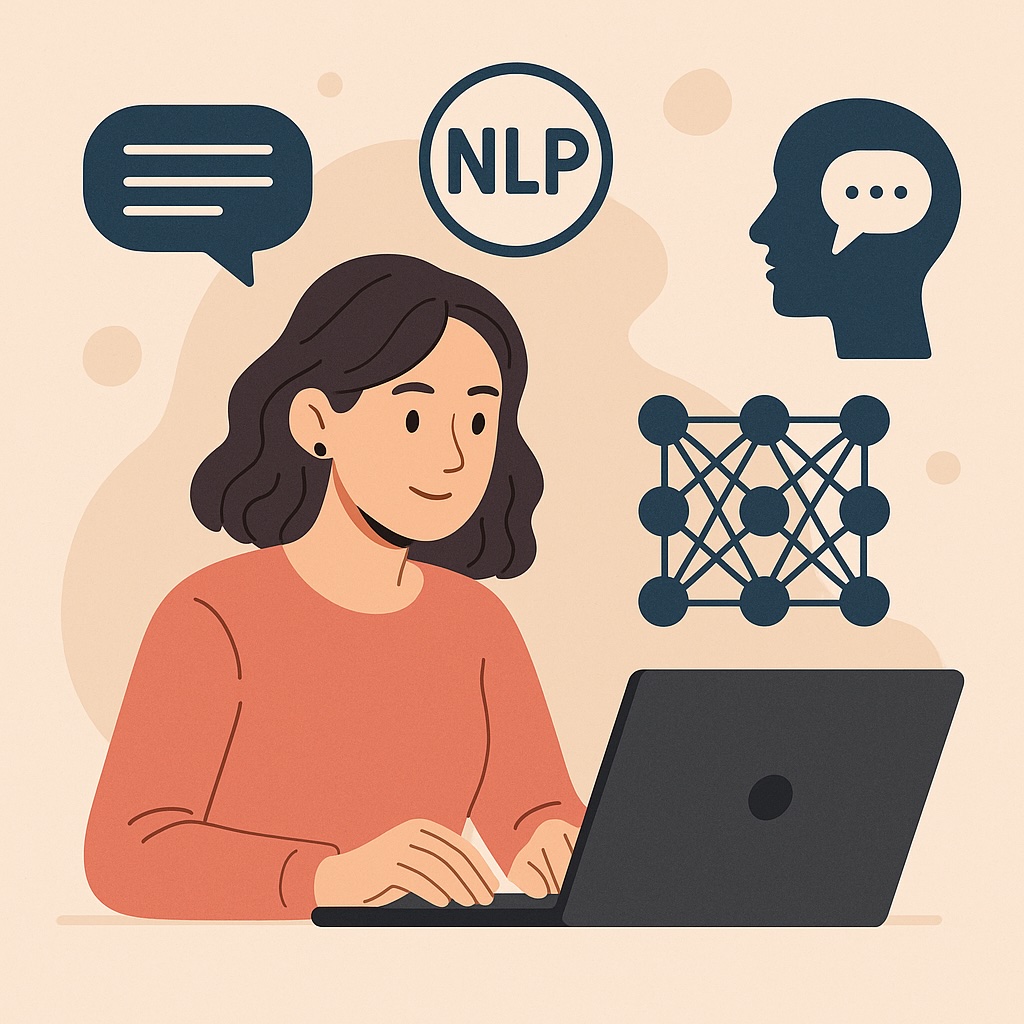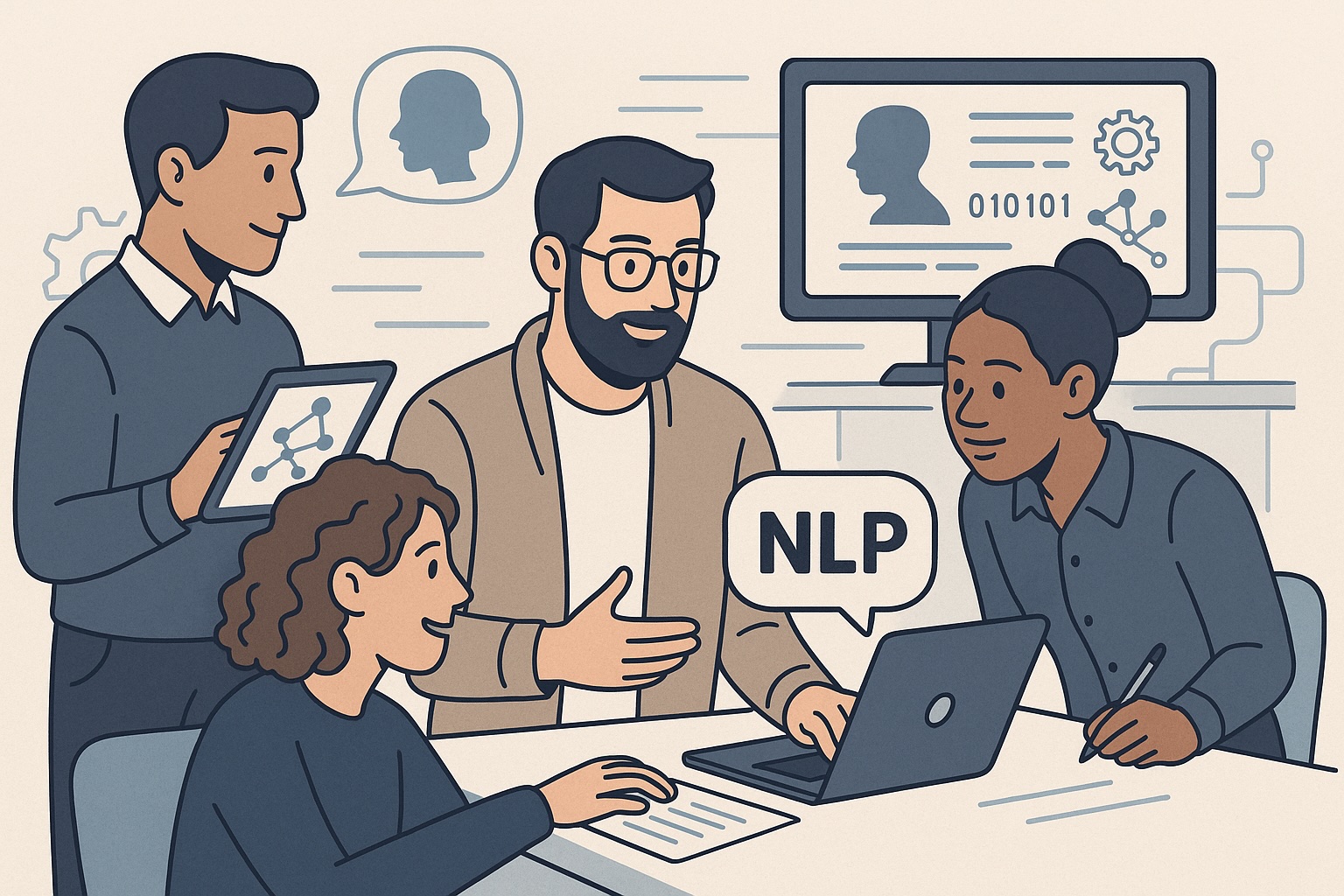What is NLP
Natural Language Processing (NLP) is a powerful and rapidly growing field within artificial intelligence (AI). NLP focuses on the interaction between human language and computers. The goal is to develop systems capable of understanding, interpreting, analyzing, and even generating human language. This enables machines to communicate with people in a natural and meaningful way – in text or speech.
What exactly does NLP do?
NLP makes it possible to convert unstructured language – such as emails, social media posts, reports, or conversations – into structured information that computers can understand. Think of recognizing meaning, tone, intent, or sentiment. NLP combines insights from linguistics, computer science, and machine learning to analyze language data and discover patterns.
Identifying patterns in language and converting them into data
NLP includes various techniques, including machine learning, linguistic theories, and statistical modeling, to recognize patterns in language and turn them into usable data. Thanks to NLP, texts can be categorized, translated, or summarized, and opinions can be analyzed.
Some common applications of NLP include:
- Speech recognition (such as with virtual assistants and dictation features)
- Automatic translation (think of Google Translate)
- Sentiment analysis (for example, for social media monitoring)
- Text mining and document classification
- Chatbots and conversational AI in customer service
- Summarizing long texts or reports
NLP and the role of AI and machine learning
Due to the rapid advances in artificial intelligence and machine learning, NLP has evolved tremendously in a short time. Modern language models can handle increasingly complex tasks, such as writing articles, having conversations, or answering questions based on context.
Deep learning techniques and transformer architectures – like those behind well-known AI models – greatly improve accuracy and relevance. As a result, NLP is no longer limited to simple search functions or spell check but now plays a key role in advanced data applications.
The future of NLP
Expectations for NLP are high. In virtually every sector – from healthcare to finance and from government to education – natural language processing is being used to make processes smarter and more efficient. Think of automated reporting, analyzing patient records, or handling customer inquiries more quickly.
As the technology continues to develop, applications will become even better at understanding nuances, context, and emotions. This will make the collaboration between humans and machines increasingly natural.
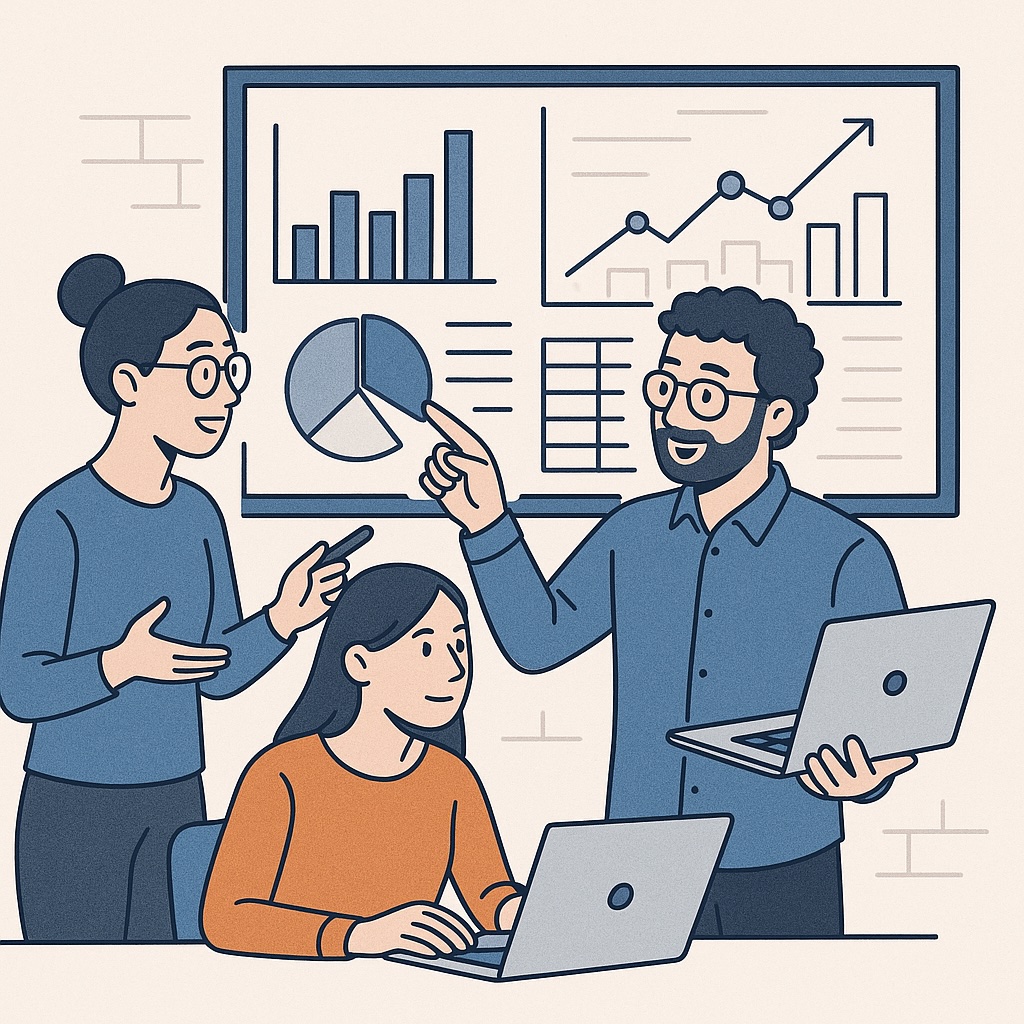
NLP and Data Science
Natural Language Processing (NLP) and Data Science are both essential parts of the broader field of Artificial Intelligence (AI) and machine learning. Although closely connected, each has its own focus, methods, and applications. In an increasingly data-driven world, both disciplines play a key role in innovation, automation, and decision-making.
What is Data Science?
Data Science is an interdisciplinary field that combines statistics, computer science, mathematics, and domain-specific knowledge to derive valuable insights from data. Data scientists work with both structured and unstructured data and use techniques such as machine learning, deep learning, predictive analytics, data mining, and data visualization.
The goal of Data Science is to uncover patterns, make predictions, and support decisions using data. Its applications are broad and diverse — from healthcare and financial services to retail, logistics, government, and media. As digital information grows rapidly, Data Science is becoming increasingly important in strategic decision-making.
What is NLP?
Natural Language Processing (NLP) is a specialized domain within AI focused on the interaction between computers and human language. It enables computers to understand, interpret, generate, and process text and speech in a natural way.
Modern NLP uses advanced techniques such as transformer-based models (e.g., BERT, GPT), deep learning, syntactic and semantic analysis, and statistical modeling. Applications are numerous: automatic translation, speech recognition, sentiment analysis, summarization tools, search engines, and smart customer service chatbots.
The Overlap Between Data Science and NLP
Data Science and NLP overlap in their use of algorithms, AI techniques, and large datasets. NLP is often considered a subdomain of Data Science when it comes to processing textual data. Both fields use machine learning and deep learning to extract value from data — whether that data is numeric, structured, or textual and unstructured.
For example: when analyzing customer feedback or reviews, data scientists use NLP techniques to extract sentiment and themes from text, then integrate these insights into broader data models or dashboards.
How Do NLP and Data Science Complement Each Other?
In practice, NLP and Data Science reinforce each other. NLP provides powerful tools to transform vast amounts of unstructured text into usable data. Data Science then offers the techniques to analyze, visualize, and apply that data in predictive models.
Consider a data science project in the healthcare sector that analyzes medical records. Here, NLP can help extract diagnoses, symptoms, and treatment paths from free text, while data science techniques combine this information with structured patient data to predict outcomes and improve treatment recommendations.
The Future of NLP and Data Science
Both NLP and Data Science continue to evolve rapidly. Thanks to generative AI, self-learning algorithms, and increasingly large language models, computers can communicate more naturally and recognize more complex patterns. At the same time, the need for transparency and ethics in both fields is growing — especially when dealing with sensitive data.
For professionals, this means that skills in both NLP and Data Science are and will remain highly valuable. The demand for specialists who can combine these techniques — for example, to build AI applications that understand human language and deliver strategic insights — is rising sharply.
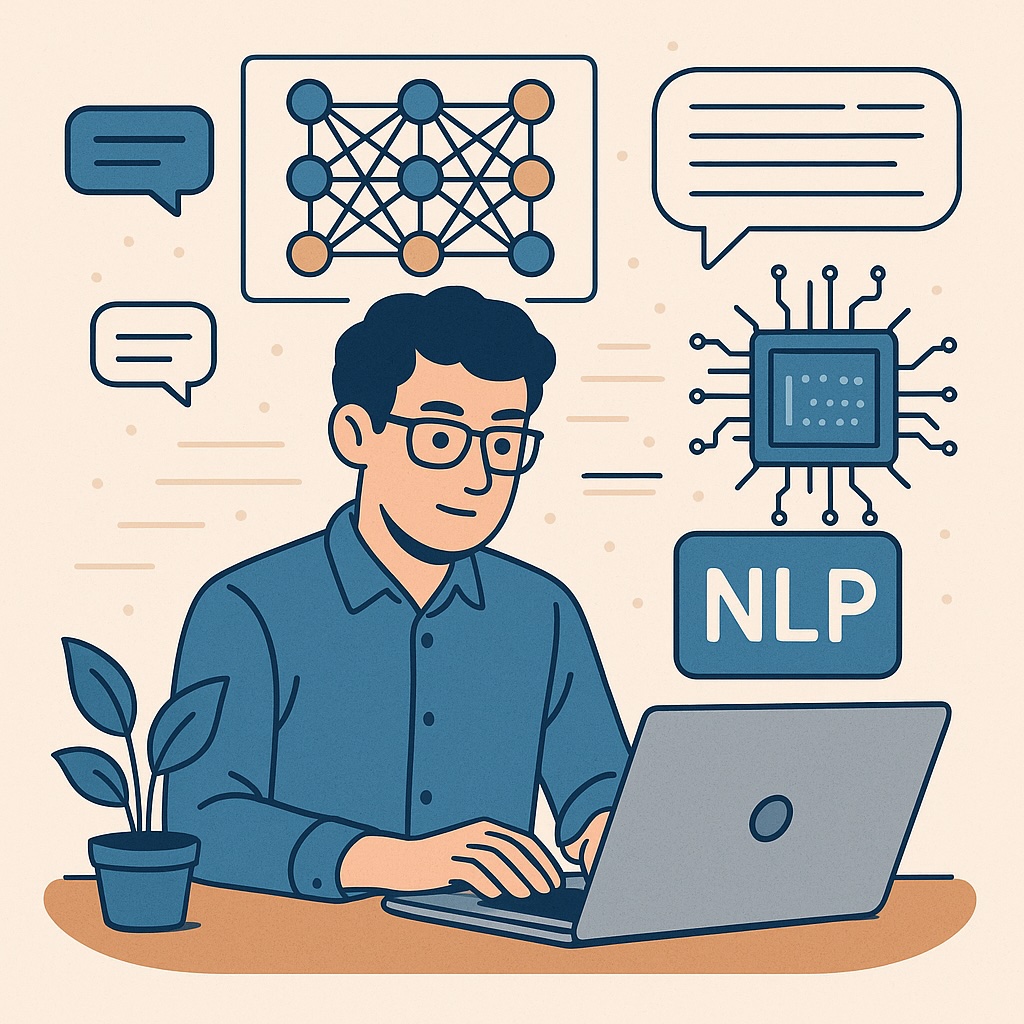
What does an NLP Specialist do
An NLP specialist is a data expert who focuses on analyzing, understanding, and generating human language using technology. NLP stands for Natural Language Processing. These experts play a key role in developing applications such as chatbots, search engines, automatic translators, and sentiment analysis tools.
What does an NLP specialist do?
NLP specialists use advanced techniques from artificial intelligence and linguistics to extract valuable insights from text and speech data. They translate complex language patterns into models that help organizations make better decisions, improve customer interactions, and enhance information processing.
Tasks and responsibilities of an NLP specialist
- Designing, training, and optimizing NLP algorithms and models, such as language models, named entity recognition, and sentiment analysis.
- Applying machine learning and data analysis to convert unstructured language data into usable information.
- Collaborating with data scientists, software engineers, and product developers to integrate NLP solutions into existing platforms, applications, and workflows.
- Identifying trends, patterns, and anomalies in large volumes of text data, for example in customer feedback, social media, or internal documentation.
- Testing, evaluating, and improving NLP systems based on performance indicators such as accuracy, recall, and F1 score.
- Staying up to date with the latest developments in language models (such as transformer architectures, BERT, and GPT), neural networks, and AI ethics.
In which sectors does an NLP specialist work?
NLP specialists are active in a wide range of sectors. Think of healthcare (for medical text analysis), the financial sector (fraud detection and compliance), e-commerce (product recommendations and search optimization), and the public sector (policy analysis and document classification). NLP experts are also indispensable at tech companies and AI startups.
Why is NLP important for organizations?
In a world where data is growing explosively, natural language processing offers a way to automatically process and understand human language data. An NLP specialist helps organizations respond more quickly to customer inquiries, detect trends in feedback, automate processes, and make better decisions based on language data.
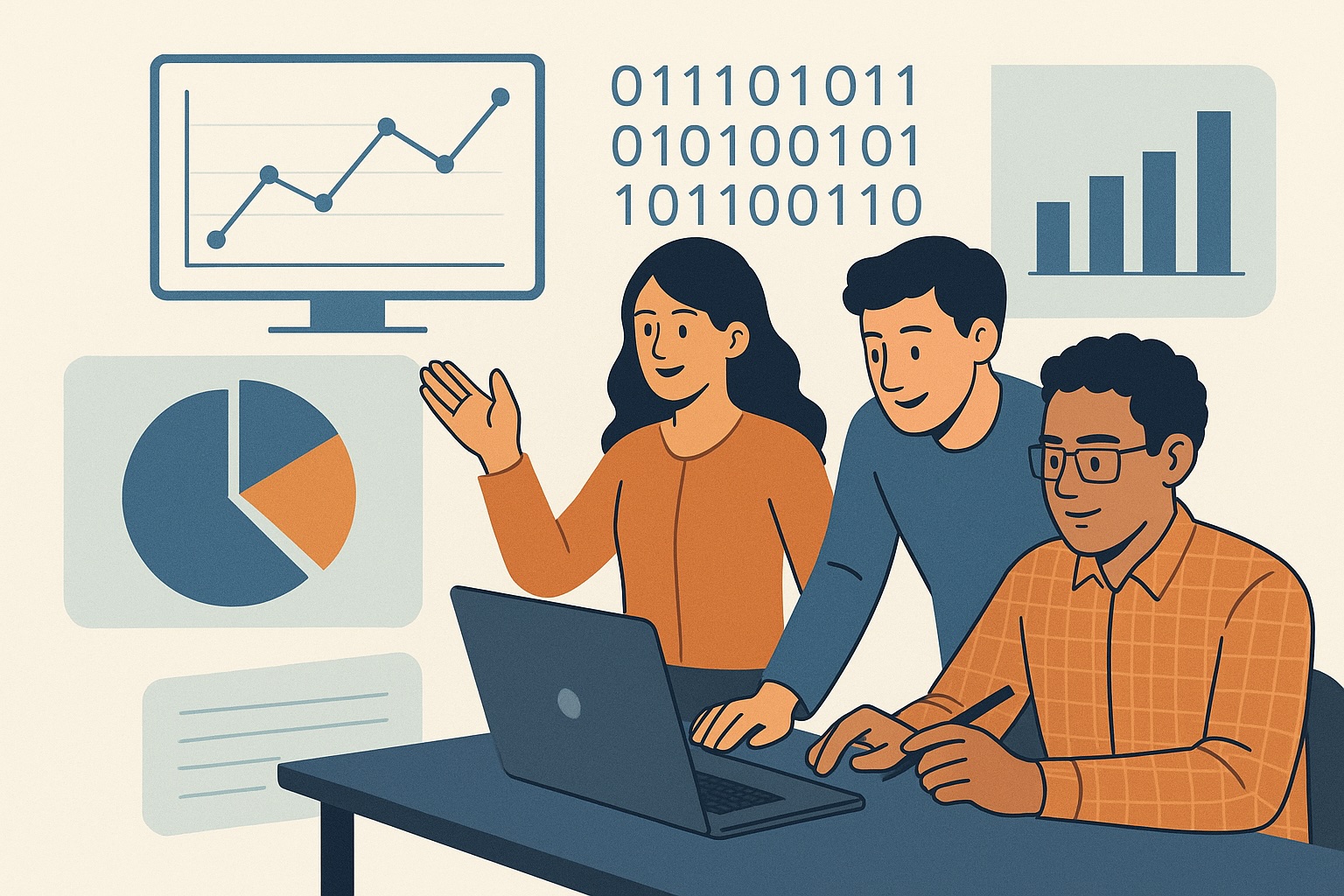
Job Profile of an NLP Specialist
Typical Responsibilities of an NLP Specialist
- Developing and implementing NLP models for various applications such as text classification, entity recognition, and sentiment analysis.
- Preprocessing raw text data, including tokenization, lemmatization, stop word filtering, and normalization.
- Integrating NLP solutions into larger data and AI systems.
- Evaluating model performance using metrics such as precision, recall, and F1-score.
- Staying up to date with the latest developments in language models, including LLMs (Large Language Models) such as GPT, BERT, and T5.
A Typical Profile of an NLP Specialist Includes:
- A relevant academic background, such as computer science, linguistics, artificial intelligence, computational linguistics, or a related field.
- Experience in programming, preferably in Python, and with machine learning libraries such as TensorFlow, PyTorch, or Hugging Face Transformers.
- Knowledge of statistical models and modern deep learning techniques for language processing.
- Familiarity with vectorization techniques such as word embeddings (Word2Vec, GloVe) and contextual embeddings (BERT, RoBERTa).
- Experience working with large datasets, including data cleaning and annotation processes.
- Strong analytical and problem-solving skills to turn complex language data into actionable insights.
- Excellent communication skills, both verbal and written, to make technical concepts understandable for both technical and non-technical stakeholders.
- Affinity with ethics, bias detection, and fairness in AI systems, especially in practical NLP applications.
Why Do Organizations Hire NLP Specialists?
Employing NLP Specialists helps organizations transform unstructured text data into valuable insights. From analyzing customer feedback to automatically generating reports, an NLP Specialist makes it possible. With the rise of large language models and generative AI, the demand for experts who can apply these techniques responsibly is increasing.
Future of the Field
The role of the NLP Specialist is rapidly evolving. Knowledge of prompt engineering, fine-tuning foundation models, and building applications with generative AI is becoming increasingly important. At the same time, foundational knowledge of classic NLP methods remains essential to understand and control models effectively.
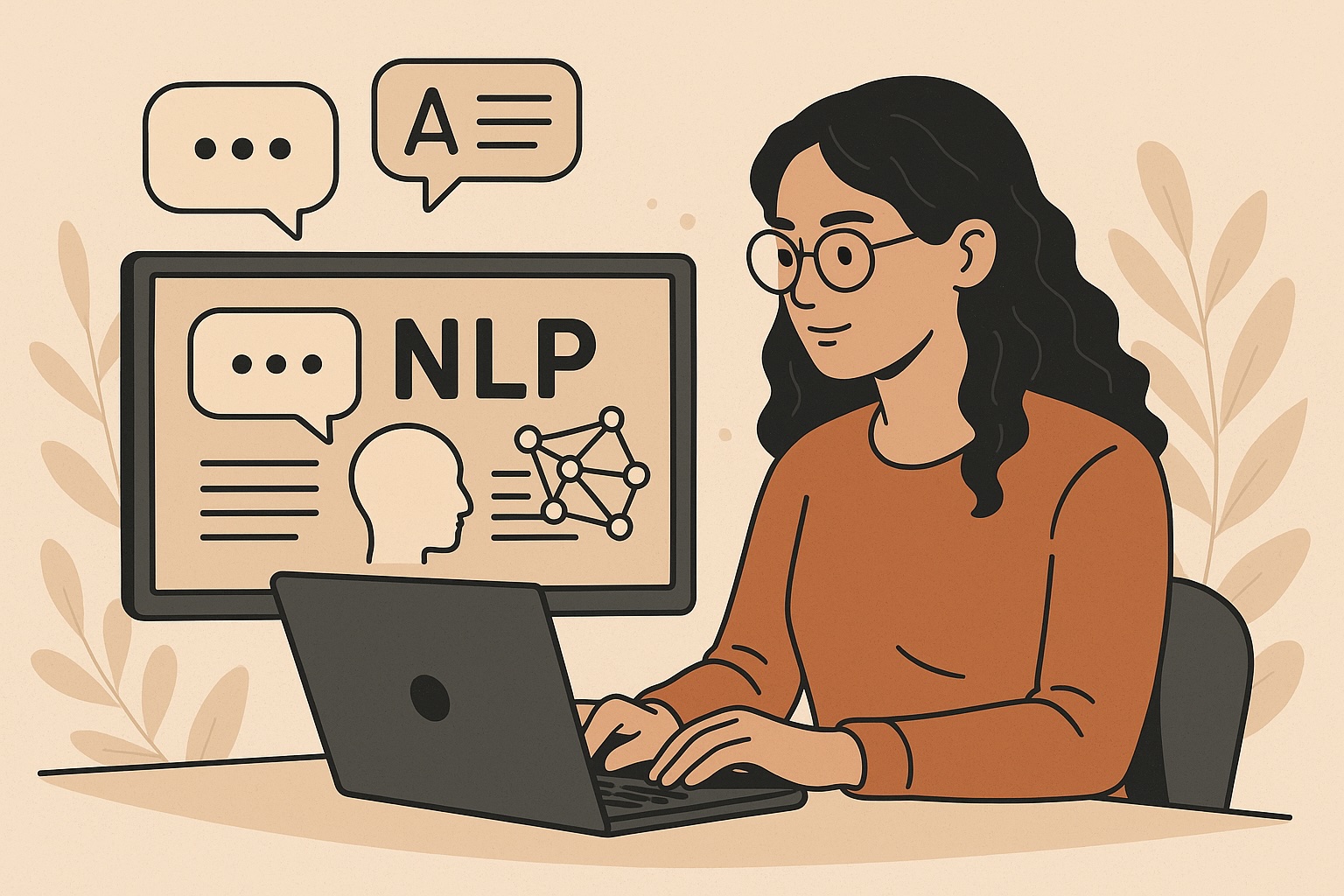
A Day in the Life of an NLP Specialist
A Day in the Life of an NLP Specialist

08:30 – The Day Begins: Coffee and Code
The day of an NLP Specialist often starts quietly. With a steaming cup of coffee, the specialist opens the laptop, checks the latest model runs from the previous day, and briefly reads through feedback from colleagues. Their workspace might be a modern open office or a quiet home office, depending on the project and team agreements.
The morning often starts with a few lines of Python or a glance at a Jupyter Notebook showing the results of an overnight training. Have the predictions improved? Does the new tokenizer work better than the previous one? These are questions that set the tone for a day full of analytical thinking.
09:30 – Daily Stand-up with the Team
After the first hour of solo work comes the daily stand-up: a short meeting with the multidisciplinary team. The NLP Specialist shares what was done yesterday, what they’re working on today, and whether there are any blockers.
These meetings often include data scientists, software engineers, UX designers, and product owners. Together, they ensure that NLP solutions not only work well but are also practically applicable in real systems – whether it’s a chatbot, an automatic summarizer, or a smart search engine.
10:00 – Deep Work: Model Development and Experiments
Time for focused work. The NLP Specialist dives into the code and works on developing a new model. The goal might be to refine sentiment analysis, apply named entity recognition to legal documents, or adapt a transformer model like BERT for a specific Dutch dataset.
Experimentation is key: models are trained, hyperparameters are adjusted, and evaluations are conducted using accuracy, recall, and F1 scores. Everything is meticulously tracked in an experiment tracker like MLflow or Weights & Biases.
12:30 – Lunch (and Sometimes Inspiration)
Lunch is a time to relax – and sometimes to get inspired. Colleagues share interesting papers or AI-related news. It’s not uncommon for an informal lunch to spark an idea for a new approach or introduce an open-source library that makes work much easier.
13:15 – Validation, Testing, and Documentation
After lunch, the work becomes more technical and critical. The specialist validates whether the developed model is not only accurate on training data but also robust on real-world test cases. Have any biases crept into the model? Is the performance consistent?
Close collaboration with QA engineers and domain experts helps uncover edge cases. Documentation is also essential: what exactly does the model do, why was this approach chosen, and how should it be integrated into the broader system?
15:00 – Literature Review and Innovation
Staying up to date with the latest developments in the NLP field is a crucial part of the job. Many specialists consciously schedule time for this. They read recent papers on arXiv, watch presentations from conferences like ACL or EMNLP, or test a new Hugging Face release.
Sometimes this leads to a proof of concept: “What if we combine GPT with our domain-specific knowledge base?” Innovation isn’t optional – it’s a core part of the profession.
16:00 – Collaboration and Integration
In the late afternoon, there's often a meeting with engineers about integrating the model into a production environment. Will it be offered via an API? Will it run in a container? What about latency and scalability?
The NLP Specialist thinks not only about the data side but also about the user experience. Together, they ensure that the NLP solution doesn’t remain isolated but truly adds value to the end product.
17:30 – Wrapping Up and Reflecting
At the end of the day, key findings are documented. A new series of experiments may be launched to run overnight. The specialist ends the day by checking the roadmap and backlog: what has been completed, and what’s the priority for tomorrow?
After a day filled with models, meetings, and insights, the work is far from done – but it’s another step closer to smarter language technology.
In Conclusion
No two days as an NLP Specialist are the same. New models, new datasets, and new applications ensure a workweek that is never boring. Whether it’s language understanding, text generation, or semantic search – language remains fascinating and full of challenges. That’s exactly why more and more people are choosing a career in this dynamic field.
Which tools does an NLP Specialist use
Tokenization and Text Cleaning Tools
An NLP specialist starts every project by cleaning and preparing text data. Powerful tools such as NLTK, spaCy, and TextBlob are used for this purpose. These libraries are essential for tokenizing text – splitting it into words or sentences – and for removing stop words, punctuation, and irrelevant text elements. They also support lemmatization (reducing words to their base form) and stemming (reducing words to their root form), which is crucial in the preparation of natural language data.
Machine Learning and Deep Learning Libraries
To build models that can understand, interpret, and generate language, NLP specialists use machine learning libraries like TensorFlow, Keras, and PyTorch. These frameworks support both traditional machine learning and advanced deep learning techniques. They are used to train models for tasks such as text classification, named entity recognition (NER), and sentiment analysis.
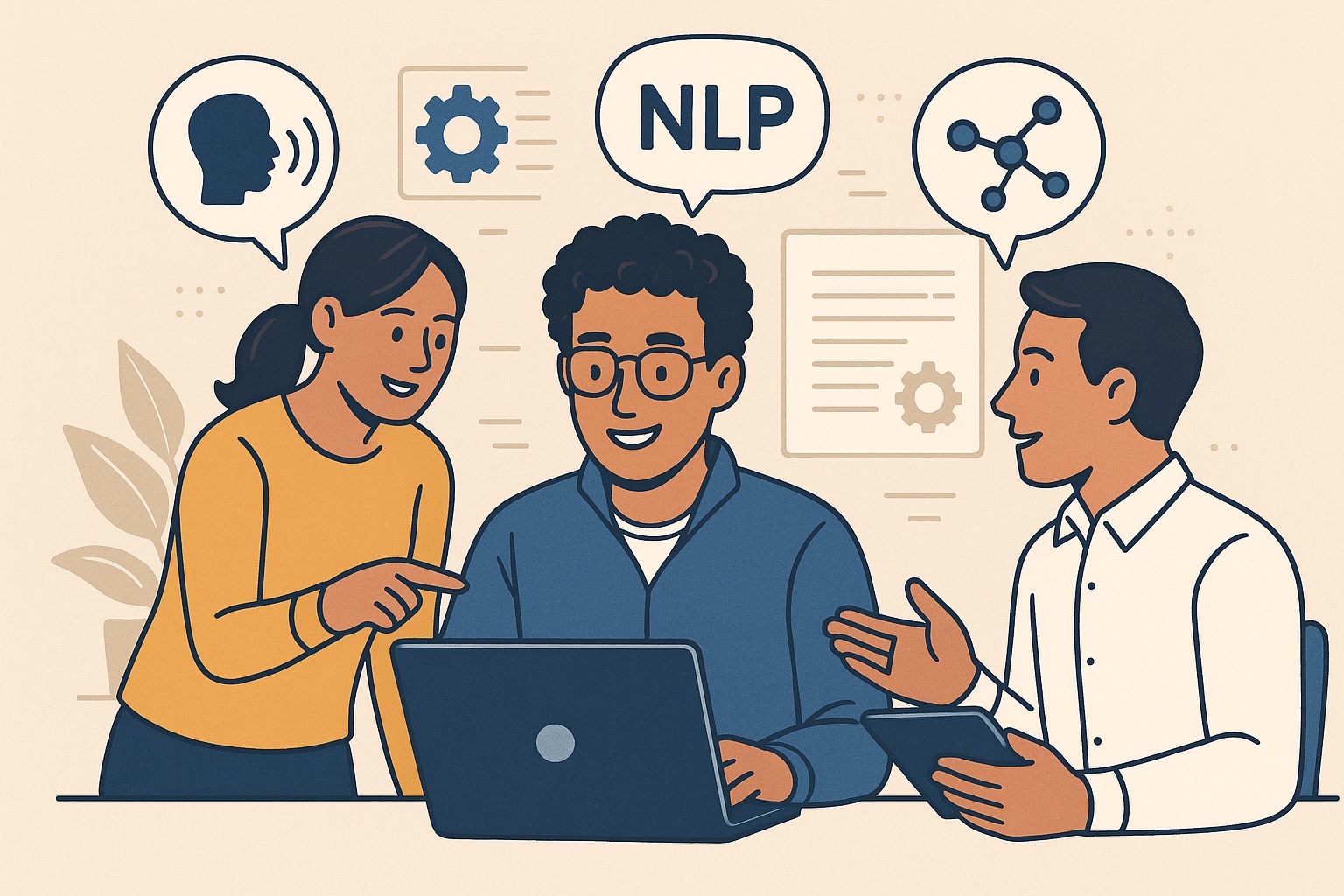
Pre-trained Models and Transformer Architectures
Modern NLP frequently uses powerful pre-trained models such as BERT, GPT-4, RoBERTa, and ELMO. These models are pre-trained on massive text corpora and can easily be fine-tuned for specific NLP tasks. They save time, increase accuracy, and enable the quick implementation of complex applications such as text generation, automatic translation, and question-answering systems.
Text Mining and Information Extraction Tools
To analyze large volumes of unstructured text data, NLP specialists use tools like RapidMiner, KNIME, and Weka. These text mining tools support the discovery of patterns, relationships, and sentiments in text. They are often used in combination with machine learning techniques to extract valuable insights from customer data, reviews, or social media.
Data Visualization Tools for NLP
Visualization is a crucial part of an NLP specialist’s work, especially when results need to be shared with stakeholders. Tools such as Matplotlib, Seaborn, and Plotly are used to create trends, frequency analyses, word clouds, and other text-related visualizations. Clear visualizations make NLP results understandable to a broader audience.
Cloud Platforms for NLP Development
NLP specialists rely on scalable cloud platforms such as AWS, Google Cloud, and Azure for training and deploying NLP models. These platforms offer powerful NLP services such as Amazon Comprehend, Google Natural Language API, and Azure Text Analytics. They enable rapid implementation and global availability of models.
Collaboration and Version Control Tools
Collaboration is essential in NLP projects. Tools like Git, GitHub, GitLab, and Bitbucket ensure effective version control of code and models. They support team members in working on codebases simultaneously, reviewing changes, and securely storing NLP project files.
Annotation Tools for NLP Training Data
For supervised learning, labeled data is essential. NLP specialists use tools like Prodigy, Doccano, and Brat to annotate text with entities, categories, or other labels. These annotation tools speed up the labeling process and improve the quality of training data for machine learning models.
API Development and Testing Tools
NLP solutions are often offered via APIs. Tools like FastAPI, Postman, and Swagger are popular among NLP specialists for developing, testing, and documenting RESTful APIs. They help integrate NLP functions into applications, websites, and other systems.
Other Popular Tools in NLP
In addition to the tools mentioned above, NLP specialists also use supporting technologies such as Hugging Face Transformers for easy access to pre-trained models, OpenNLP for traditional NLP tasks, and LangChain for building chains with Large Language Models (LLMs). These tools further expand the possibilities of NLP applications.
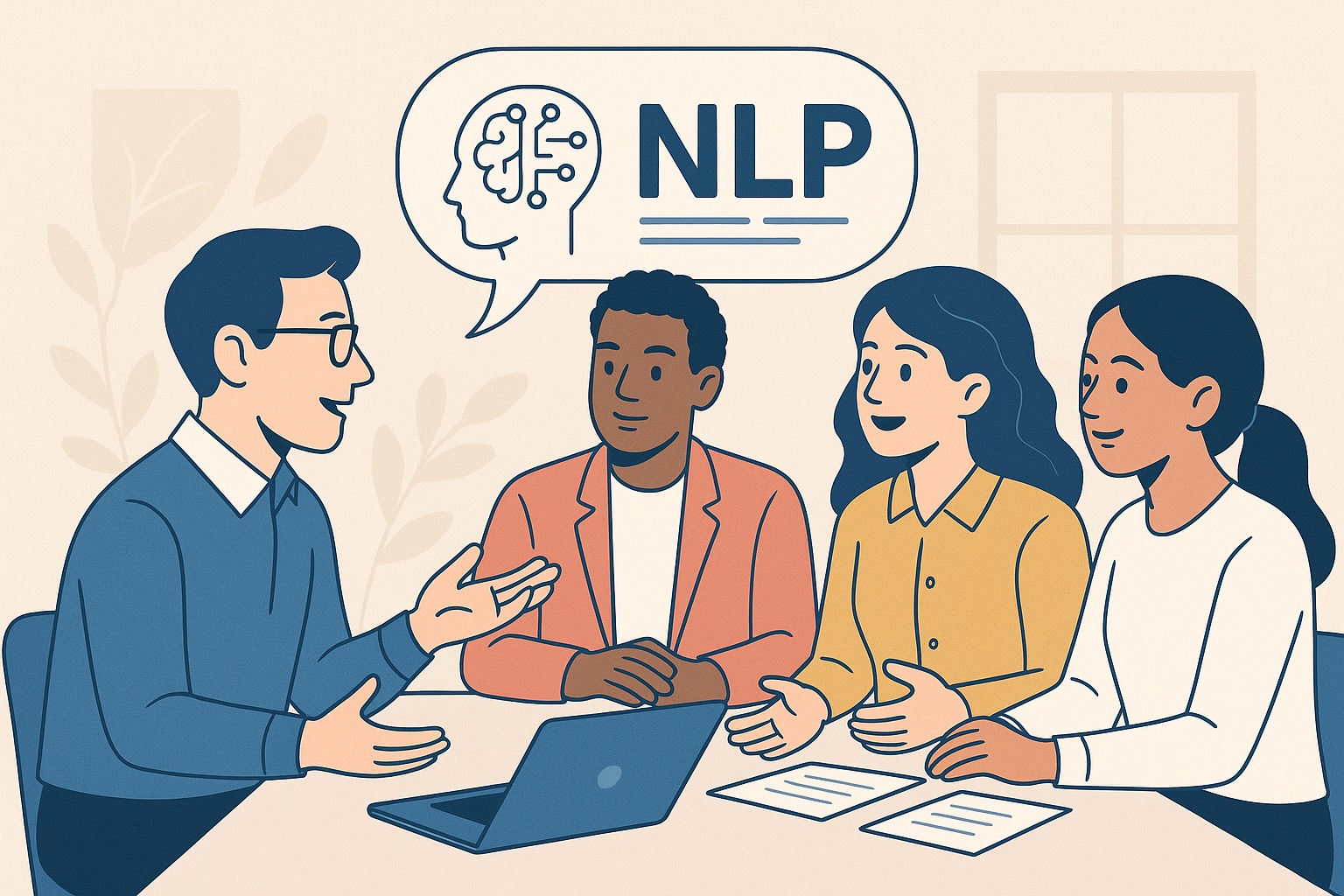
What does an NLP Specialist earn
The salary of a NLP Specialist (Natural Language Processing Specialist) can vary greatly depending on factors such as experience, location, sector, and the size of the organization. NLP Specialists are experts in developing systems that can understand, interpret, and generate human language. They play a key role in applications such as chatbots, automatic translations, sentiment analysis, and speech recognition. Below is an overview of salary expectations by experience level.
Entry Level (Junior NLP Specialist)
A Junior NLP Specialist, often recently graduated in fields such as artificial intelligence, computational linguistics, or data science, can expect a salary of €3,200 to €4,200 per month. At this level, they typically work under supervision on projects such as preprocessing text data, training simple models, or supporting senior team members. Skills in Python, basic machine learning knowledge, and experience with NLP libraries such as spaCy, NLTK, or Hugging Face are considered a plus.
Mid-level (NLP Specialist)
An NLP Specialist with 2 to 5 years of experience earns on average between €4,200 and €5,800 per month. Professionals at this level usually have deeper experience with language models, embedding techniques, and frameworks such as Transformers. They are capable of independently training, evaluating, and implementing models and often contribute to larger AI projects within organizations. Knowledge of cloud platforms (such as AWS or Azure), CI/CD, and MLOps is increasingly desired at this level.
Senior Level (Senior NLP Specialist)
A Senior NLP Specialist with more than 5 years of experience can expect a salary between €5,800 and €7,500 per month. These specialists develop and optimize advanced language models, mentor other team members, and advise on the strategic use of NLP within the organization. They are familiar with both the scientific aspects (such as BERT, GPT, and LLMs) and the practical application of NLP in production environments. Skills in deep learning, data ethics, and managing bias in language models are becoming increasingly important here.
Lead NLP Specialist / NLP Team Lead
In larger organizations, a Lead NLP Specialist or NLP Team Lead can earn a salary of €7,500 to €9,000 per month. This role combines deep technical knowledge with leadership. The Lead NLP Specialist sets the technical direction, ensures the quality of NLP solutions, and manages a team of specialists. They often work closely with product teams, data scientists, and software engineers to develop scalable, robust NLP solutions.
Location and Sector
Location plays an important role in the salary level of NLP Specialists. In tech hubs such as Amsterdam, Utrecht, and Eindhoven, salaries tend to be higher due to the concentration of AI startups, scale-ups, and research institutes. Sectors such as fintech, e-commerce, healthcare, and government offer attractive salaries, especially when NLP is used for complex, business-critical applications such as compliance monitoring, automatic diagnosis, or customer interaction.
Education and Skills
NLP Specialists with a master's or PhD background in artificial intelligence, computational linguistics, or a related field can generally expect a higher starting salary. Important skills include: experience with NLP frameworks (such as Hugging Face Transformers), programming languages like Python, knowledge of deep learning (TensorFlow, PyTorch), and experience with fine-tuning large language models (LLMs). Additionally, experience with data management, data structuring, and preventing bias in language models is increasingly relevant.
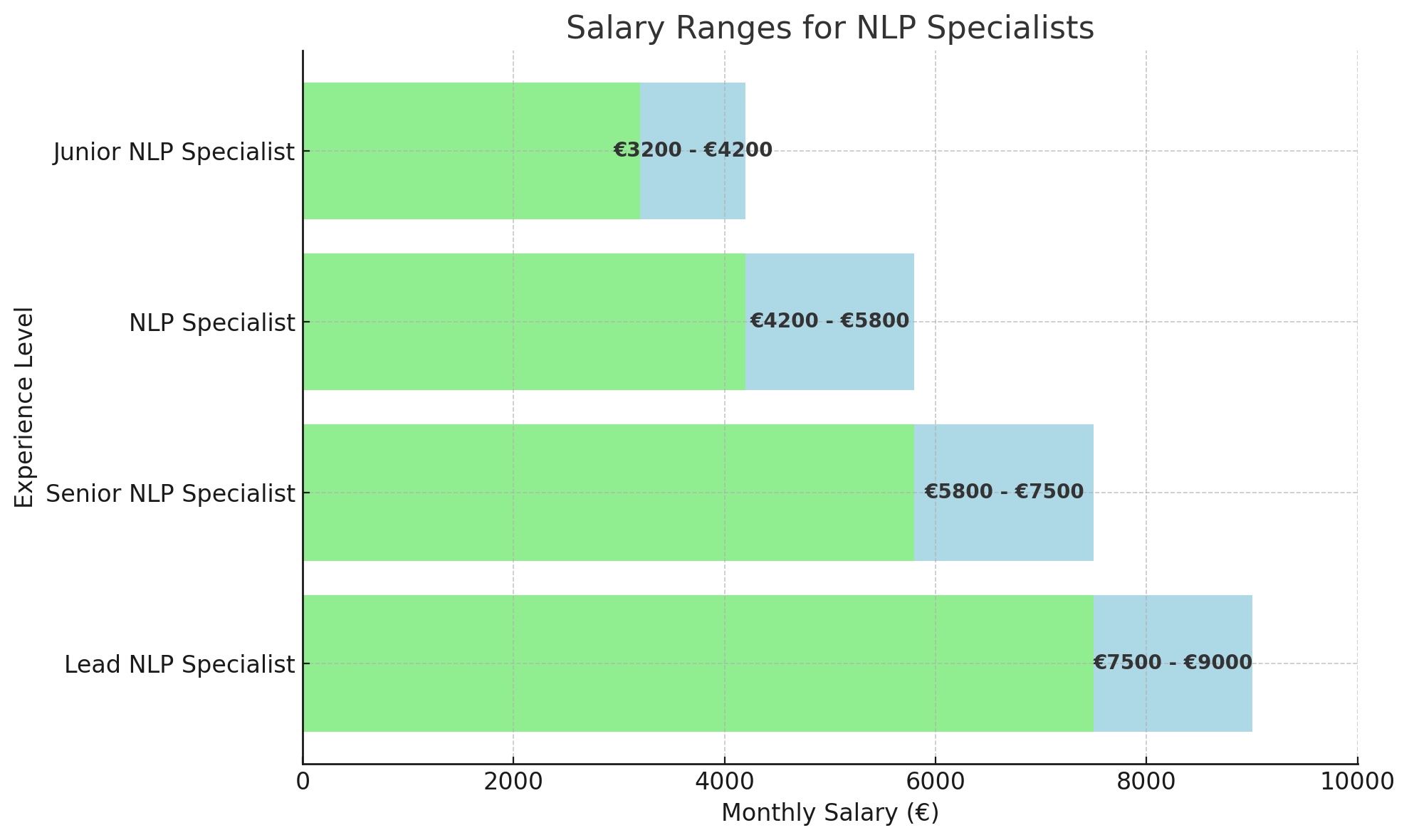
Career path and growth opportunities as an NLP Specialist
A career as a NLP Specialist (Natural Language Processing Specialist) offers plenty of opportunities for growth, development, and specialization. In an era where language models, AI chatbots, and automated language processing are becoming increasingly important, the demand for NLP experts is growing rapidly.
What does an NLP Specialist do?
As an NLP Specialist, you focus on designing, training, and improving systems that can understand, interpret, and generate human language. Think of applications like speech recognition, automatic translation, sentiment analysis, and text generation. You often work with large datasets, neural networks, and machine learning algorithms.
Career path and growth opportunities
As you gain more experience in the field of Natural Language Processing, your impact within organizations also grows. You can advance to roles with more responsibility, such as:
- NLP Team Lead – you lead a team of data scientists and NLP engineers and oversee the quality and strategy of NLP projects.
- Senior NLP Specialist – you become the go-to expert within your organization, often with a specialization in deep learning or semantic models.
- Chief Data Scientist – you define the data strategy at the organizational level and oversee multiple AI initiatives.
- CTO (Chief Technology Officer) – you guide the technological vision of an organization, with a focus on innovation and data science.
Specialization within NLP
Within NLP, you can also delve into specific application areas, such as:
- Conversational AI and chatbots – you develop intelligent dialogue systems for customer service or virtual assistants.
- Sentiment analysis – you analyze customer feedback, reviews, and social media to gain insights into emotions and opinions.
- Automatic translation – you work on systems that can translate text in real-time, often using neural networks.
- Document analysis – you help organizations automatically process large volumes of documents, for example in the legal or financial sector.
Future outlook and trends
The future for NLP Specialists looks very promising. With the rapid rise of generative AI, such as large language models (LLMs), the role of NLP expert is increasingly shifting toward the strategic and ethical use of language models within organizations. Skills like prompt engineering, model fine-tuning, and building responsible AI solutions are becoming more important.
Working with multimodal models – which process not only text but also images, audio, or video – also presents new opportunities for NLP professionals with a broad perspective and an interest in innovation.
A dynamic and future-proof profession
Whether you're just starting out as a junior NLP Specialist or have years of experience, the field continues to evolve. With the right mindset, curiosity, and focus on technological innovation, you can make a valuable contribution to the future of language and technology.
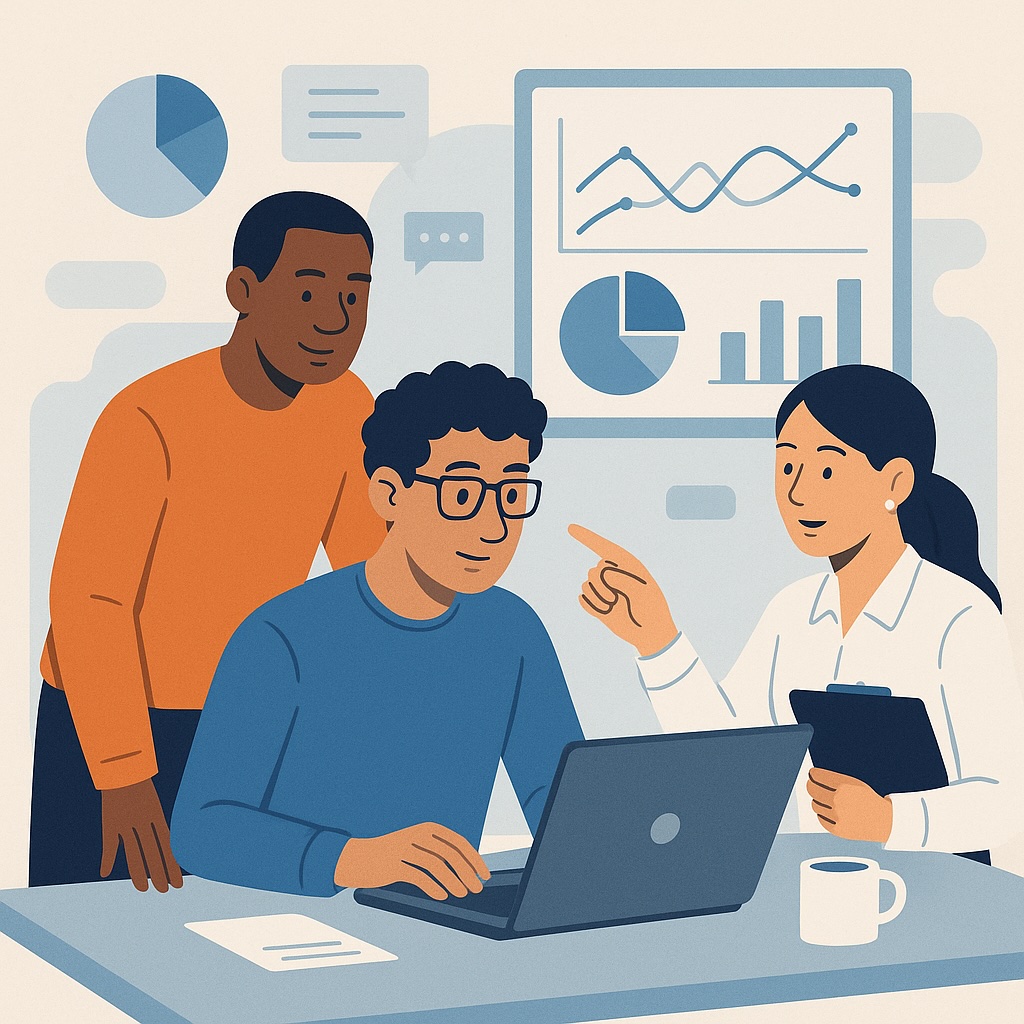
Education and Certification for NLP Specialists
To be successful as an NLP Specialist, it is essential to continuously invest in your knowledge, skills, and professional development. Natural Language Processing (NLP) is a rapidly evolving field within data science and artificial intelligence. That’s why it’s important to keep your knowledge up to date through a combination of academic education, practical training, and internationally recognized certifications.
Why education and certification are important for NLP specialists
A solid foundation in data analysis, statistics, machine learning, and linguistics is indispensable for any professional aiming to specialize in NLP. In addition, certification offers valuable proof of your skills and boosts your credibility with employers or clients. Staying up to date with the latest NLP techniques, tools, and frameworks also increases your employability in an increasingly competitive job market.
Popular certifications and courses for NLP professionals
There are various courses and certifications available that specifically focus on NLP or the broader domain of machine learning and artificial intelligence. Some widely followed and highly regarded options include:
- NLP Professional Certificate – Focused on practical applications of natural language processing in Python, including tokenization, sentiment analysis, topic modeling, and transformer models.
- Deep Learning Specialization – A series of courses covering neural networks and their application in NLP, including LSTMs and attention mechanisms.
- Machine Learning Certificate – Offers a broader foundation in machine learning techniques that are also frequently applied in NLP projects, such as classification, regression, and clustering.
What else can help you as an NLP Specialist
In addition to formal certifications, it is recommended to continuously improve your skills through self-study, open-source projects, meetups, or participating in competitions like Kaggle. Working with commonly used NLP libraries such as spaCy, Hugging Face Transformers, NLTK, and gensim helps you put theory into practice.
In conclusion
The role of an NLP Specialist requires a combination of technical expertise, linguistic insight, and a constant drive to learn. By investing in the right education and certification, you lay a solid foundation for a successful career in natural language processing. Whether you want to work in the public sector, at a tech company, or as an independent consultant – up-to-date knowledge and recognized qualifications make all the difference.
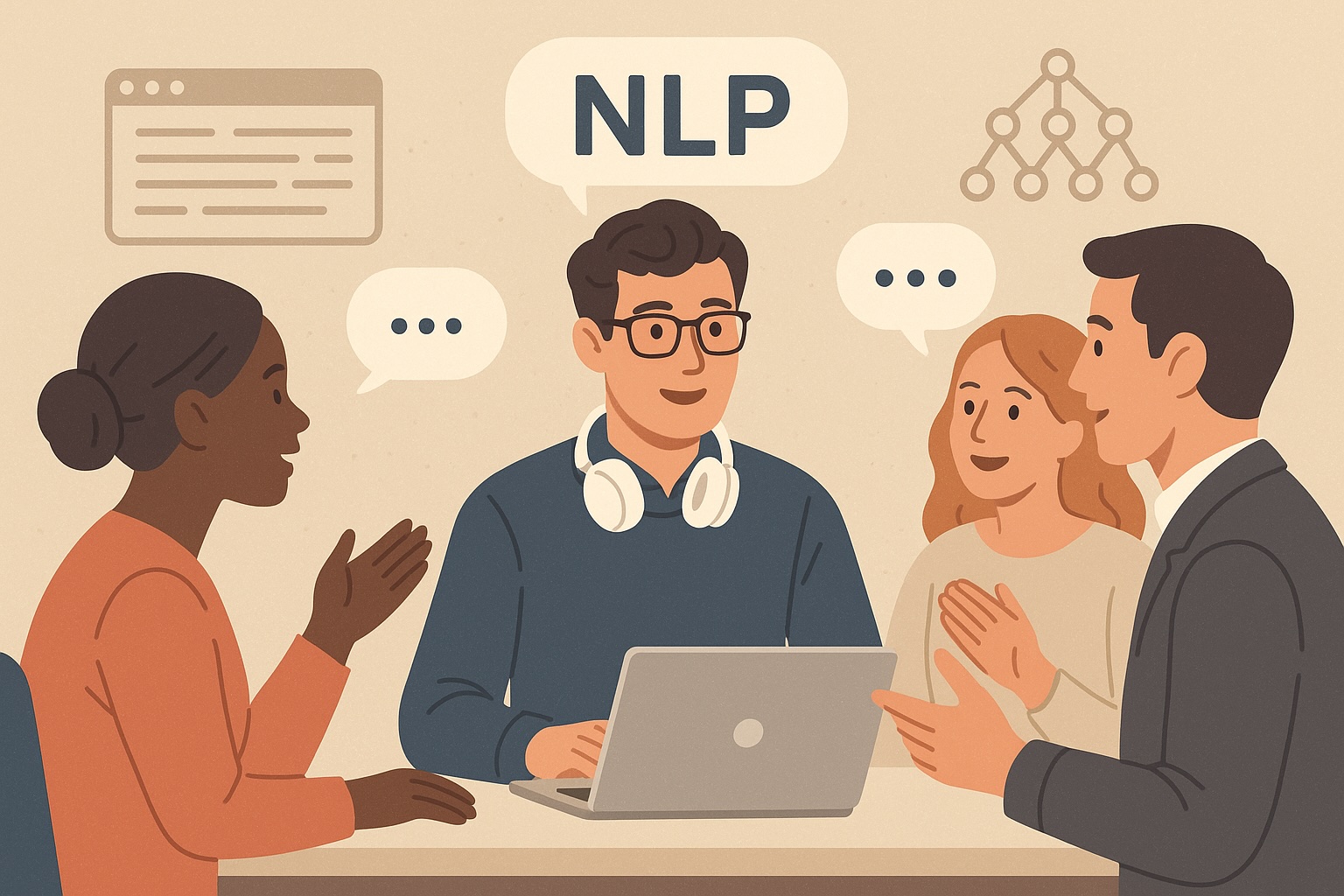
Networking and industry organizations
Industry Organizations and Networks in NLP
For Natural Language Processing (NLP) specialists, it is essential to stay actively engaged with the professional community. By joining relevant industry organizations and actively networking, you not only expand your knowledge but also increase your visibility and career opportunities within the field.
Membership in Industry Organizations
Being a member of leading industry organizations, such as the Association for Computational Linguistics (ACL), provides direct access to the latest publications, whitepapers, and research in NLP and language models. In addition, you have the opportunity to contribute to professional discussions, participate in international projects, and stay informed about ethical and technological developments within the domain of artificial intelligence and machine learning.
Trade Shows, Conferences, and Seminars
Attending conferences, trade shows, and seminars is an excellent way to stay up to date with the latest trends in NLP. These events often feature the newest algorithms, applications, and tools presented by leading experts in the field. Moreover, they offer ideal opportunities to expand your network with like-minded professionals, researchers, and representatives from leading companies.
Networking with Other NLP Professionals
Building and maintaining a professional network is of great importance for anyone working in the NLP field. This includes actively participating in (online) communities such as forums, LinkedIn groups, or Slack channels specifically focused on language technology. Through these networks, you can share experiences, ask for advice, and connect with recruiters, project partners, or potential employers.
Keep Learning and Growing
The world of NLP is evolving rapidly. By continuously investing in your professional development, you remain relevant in a competitive market. Whether you're working on syntactic parsers, transformer models, or conversational AI, joining industry organizations and having a strong network are the keys to success in this dynamic field.
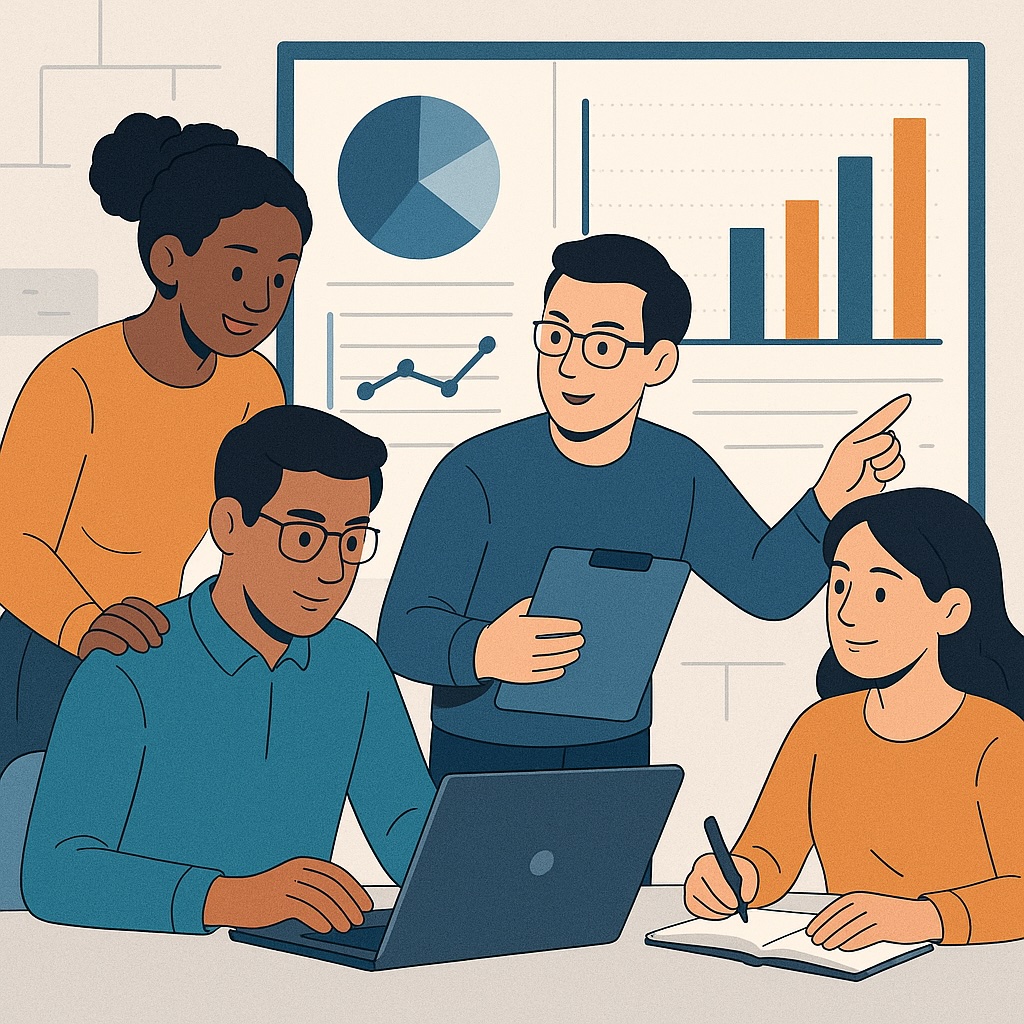
Impact and societal relevance
The societal impact and relevance of the NLP Specialist
An NLP Specialist (Natural Language Processing Specialist) plays a key role in how technology interacts with human language. By developing systems that can analyze, understand, and generate language, the NLP Specialist is at the heart of countless innovations that affect our daily lives. Think of smart chatbots, automatic translation tools, speech recognition, and text analysis systems. The applications are broad and socially relevant.
Deep impact across various sectors
The expertise of an NLP Specialist has become indispensable in sectors such as healthcare, finance, government, education, and customer service. In healthcare, for example, NLP helps automatically analyze medical records and identify trends in patient data. In the financial sector, NLP is used for risk assessment, fraud detection, and automated reporting. Government institutions use NLP to make policy documents more accessible or to analyze public responses.
Social relevance of NLP technology
The social relevance of NLP goes beyond business efficiency. NLP technology makes information accessible to people with disabilities, helps bridge language barriers, and contributes to inclusive communication. For people with reading or language difficulties, voice-controlled technology can make a real difference. In addition, real-time translation services and voice assistants are becoming increasingly important in a globalizing society.
Insight into emotions and trends
Another important domain where the NLP Specialist has an impact is sentiment analysis. Companies, policymakers, and social organizations use this technique to gain insight into public opinion, customer satisfaction, and social trends. In this way, NLP contributes to better-informed decision-making on both commercial and societal levels.
Future-oriented innovations
As AI technology continues to evolve, so does the role of NLP. From ethical AI to responsible data use, NLP Specialists are at the heart of these developments. By deploying language models responsibly, they contribute to technology that is not only smart but also human-centered.
The NLP Specialist as a bridge between humans and machines
The relevance of the NLP Specialist lies in the ability to make technology more human and accessible. They bridge the gap between humans and machines, ensuring that digital interactions feel natural. In doing so, they are invaluable to both organizations and society as a whole.
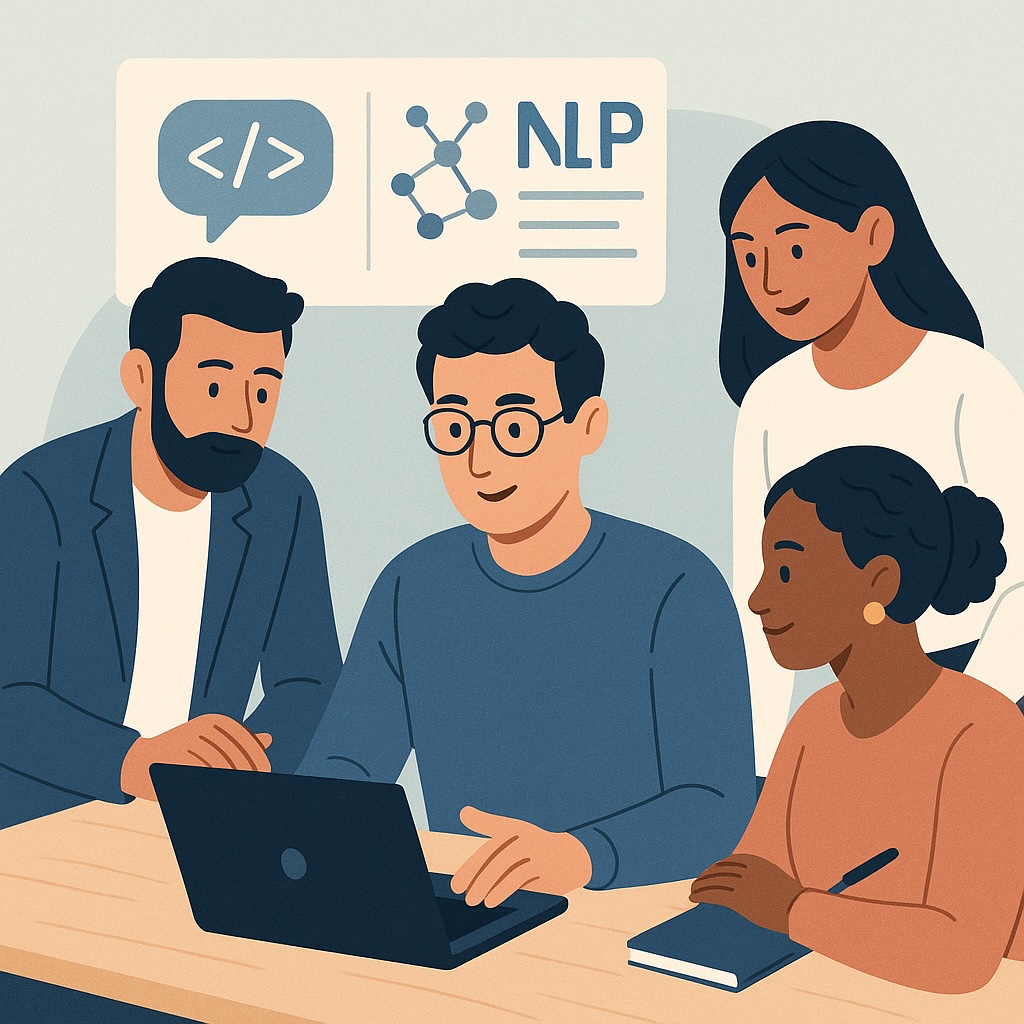
Case Study: The Role of an NLP Specialist
Background
Datacon is a fast-growing fintech company focused on delivering personalized financial services. With their customer-centric approach, they quickly built a solid reputation. But success has its downside: the customer service team saw an exponential increase in incoming messages via chat and email. Every day, hundreds of inquiries came in — ranging from simple requests to complex financial issues. The team could barely keep up with the growth. The big challenge? How to streamline communication with customers without losing the personal touch that made them so strong in the first place.
The Challenge
It became increasingly clear that manually handling customer inquiries was no longer sustainable. Waiting times increased and staff became overloaded. Still, Datacon didn’t want to compromise on the quality of their service. The challenge was to find a solution that eased the pressure on customer service while still helping customers quickly and accurately — preferably in a way that strengthened their trust in Datacon.
Action by the NLP Specialist
Lars, an experienced NLP Specialist, was brought in to turn the tide. His mission: develop a smart chatbot that can automatically recognize and respond to customer inquiries. Lars began with an in-depth analysis of thousands of past customer conversations. He uncovered patterns, frequently asked questions, and recurring user frustrations. He then worked with the customer service team to build a comprehensive and up-to-date knowledge base.
Using advanced Natural Language Processing techniques, Lars taught the chatbot to recognize the intent behind each question — whether it was short and vague ("I don't understand my statement") or long and detailed. He ensured the chatbot's responses were not only accurate but also friendly, clear, and aligned with Datacon’s tone of voice.
Result
The launch of the NLP-powered chatbot marked a turning point for Datacon. The workload on the customer service team dropped by more than 40%, as the chatbot directly answered the most common questions. Customers no longer had to wait in line and received help within seconds.
What stood out most: customer satisfaction noticeably increased. Users appreciated the speed, clarity, and friendliness of the new digital assistant. For Datacon, this meant not only lower costs and more efficient processes, but above all: a better customer experience. Thanks to Lars’ expertise, customer service transformed from a bottleneck into a strength.

Looking for an NLP Specialist?
For a small fee, you can easily post your vacancies on our platform and reach our large, relevant network of data and analytics professionals. Applicants respond directly to you, without any third-party involvement.
On DataJobs.nl, we connect supply and demand in the data and analytics job market directly—without intermediaries. You won’t find any vacancies from recruitment agencies here. Visitors can view all job listings for free, without an account, and apply directly.
View the options for posting vacancies here. Questions? Contact us!

Op zoek naar een uitdaging in data & analytics?
Bekijk hier alle actuele kansen! See vacancies- What is NLP
- NLP and Data Science
- What does an NLP Specialist do
- Job Profile of an NLP Specialist
- A Day in the Life of an NLP Specialist
- Which tools does an NLP Specialist use
- What does an NLP Specialist earn
- Career path and growth opportunities as an NLP Specialist
- Education and Certification for NLP Specialists
- Networking and industry organizations
- Impact and societal relevance
- Case Study: The Role of an NLP Specialist
- Vacancies for NLP Specialists
- Looking for an NLP Specialist?


